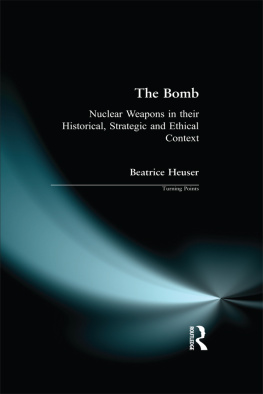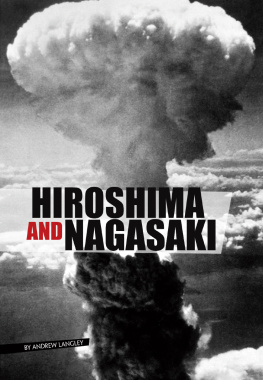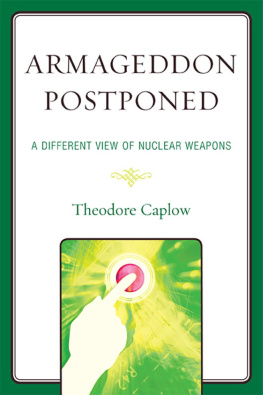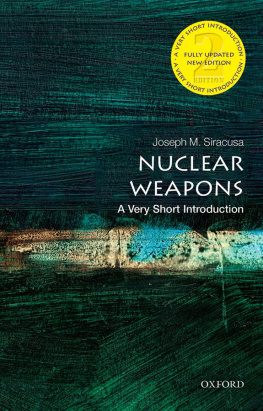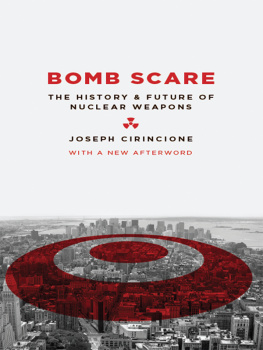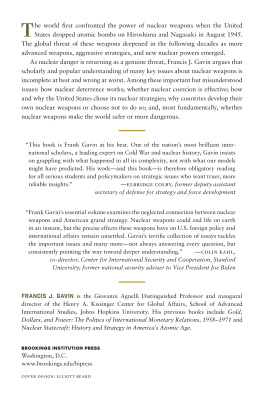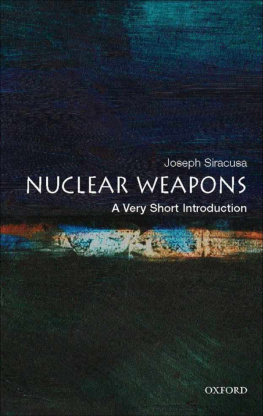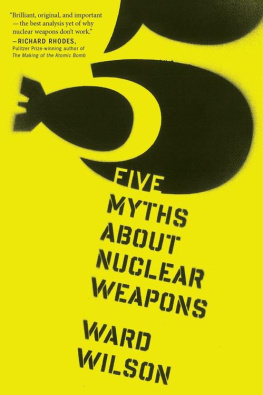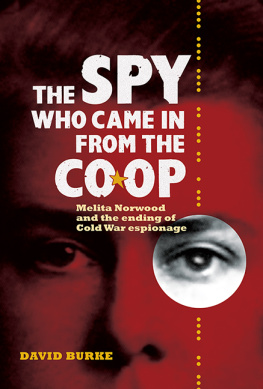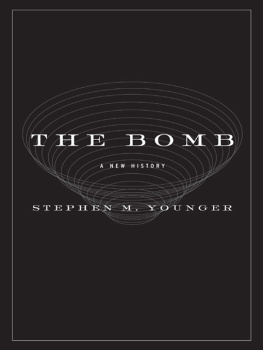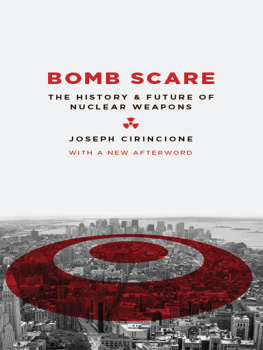The Bomb
TURNING POINTS
General Editor: Keith Robbins
Vice Chancellor, University of Wales Lampeter
This ambitious new programme of books under the direction of Professor Keith Robbins ( already General Editor of Longmans very successful series Profiles in Power) will examine moments and processes in history which have conventionally been seen as turning points in the emergence of the modern world. By looking at the causes and long-term consequences of these key events, the books will illuminate the nature of both change and continuity in historical development. There are numerous titles in active preparation, and the following are already available:
The End of the Ottoman Empire, 19081923
A.L. Macfie
The Paris Commune, 1871
Robert Tombs
The Bomb
Nuclear Weapons in their Historical,
Strategic and Ethical Context
BEATRICE HEUSER
First published 2000 by Pearson Education Limited
Published 2014 by Routledge
2 Park Square, Milton Park, Abingdon, Oxon OX14 4RN
52 Vanderbilt Avenue, New York, NY 10017, USA
Routledge is an imprint of the Taylor & Francis Group, an informa business
Copyright 2000, Taylor & Francis.
The right of Beatrice Heuser to be identified as author of this Work has been asserted by her in accordance with the Copyright, Designs and Patents Act 1988.
All rights reserved. No part of this book may be reprinted or reproduced or utilised in any form or by any electronic, mechanical, or other means, now known or hereafter invented, including photocopying and recording, or in any information storage or retrieval system, without permission in writing from the publishers.
Notices
Knowledge and best practice in this field are constantly changing. As new research and experience broaden our understanding, changes in research methods, professional practices, or medical treatment may become necessary.
Practitioners and researchers must always rely on their own experience and knowledge in evaluating and using any information, methods, compounds, or experiments described herein. In using such information or methods they should be mindful of their own safety and the safety of others, including parties for whom they have a professional responsibility.
To the fullest extent of the law, neither the Publisher nor the authors, contributors, or editors, assume any liability for any injury and/or damage to persons or property as a matter of products liability, negligence or otherwise, or from any use or operation of any methods, products, instructions, or ideas contained in the material herein.
ISBN 13: 978-0-582-29290-1 (pbk)
British Library Cataloguing in Publication Data
A catalogue entry for this title is available from the British Library
Library of Congress Cataloging-in-Publication Data
Heuser, Beatrice, 1961
The bomb : nuclear weapons in their historical, strategic, and ethical context / Beatrice Heuser.
p. cm. (Turning points)
Includes bibliographical references and index.
ISBN 0-582-29291-3 (hbk). ISBN 0-582-29290-5 (pbk.)
1. Nuclear weaponsHistory. 2. Nuclear weaponsMoral and ethical aspects. I. Title. II. Series: Turning points (Longman (Firm) )
U264.H48 2000
355.0217dc21
99-24935
CIP
Set by 35 in 10/12pt Baskerville
For
Julian Chrysostomides,
Admiral Marcel Duval,
Professor Robert ONeill and
Professor Donald Cameron Watt
Contents
The most enjoyable part of writing a book, I feel, is to write the acknowledgements, as this is one of the few formal ways in which one can express gratitude, and make ones intellectual debts known publicly without embarrassment. I am very grateful to Professor Keith Robbins, the general editor of this series, for asking me to write this book. It gave me a welcome opportunity to put down reflections which had been going around in my mind since 1991, when I started to lecture at the Department of War Studies, Rings College London. Since 1989, I had been studying the development of nuclear strategies, and over the past years I have been trying to put them in the context of the overall development of warfare and strategic thinking. It dawned upon me very quickly that preferences in nuclear strategy are not just a function of technology or geography, but also of beliefs and values.1 Arguments about whether the use of nuclear weapons would be appropriate in certain circumstances are thus not merely functions of whether these weapons are available for use and can be carried to their targets: they are functions of many other considerations, such as whether the enemy can avenge such use by also using nuclear weapons, whether the world will be safe to live in after a nuclear exchange or even only a unilateral use, on whether one can live with oneself after the use of nuclear weapons. All this has alerted me to the different levels on which nuclear weapons have to be discussed, and I am grateful to be given this opportunity to articulate my thoughts. But I also wish to express my deep gratitude to Professor Robbins for all the advice he has given me over time.
There are some other friends and colleagues who deserve my thanks for comments on this book, and they include in particular Dr Philip Sabin at Kings, Sebastian Cox, Head of the Air Historical Branch of the Ministry of Defence, and Marcellin Hodeir at the French Ministry of Defences Air Historical Service (SHAA) who gave me most constructive advice on my chapter dealing with the development, theory and use of air power; Bruce Mann, to whose pages of challenging remarks and thoughtful criticism I was not always able to do full justice; and Dr Saki Dockrill and Dr Barrie Paskins, again at Kings, who commented very helpfully on chapters on the end of the Second World War and on the evolution of antiwar movements respectively. I must emphasise that all opinions, where not credited directly to other works, are entirely my own, and all remaining errors are due entirely to my own inadequacies. Greatest thanks are due to my parents, who saw little of me during the years when my visits had to be short to save time for reading and writing, and to my husband who has made many sacrifices for my work and who has unselfishly encouraged me to keep at it, making very helpful comments, too, on the of this book.
This book is dedicated to Julian Chrysostomides, for her patient support of my earliest efforts in writing and reasoning and her continued encouragement since; to Admiral Marcel Duval both for all he taught me about French military thinking, and also for his personal efforts with regard to international reconciliation and for the values which he defends (and for which, in turn, I admire him boundlessly); to Professor Robert ONeill, for his generous and vital support for my work; and to Professor Donald Cameron Watt, to whom, besides admiration for his personal values, I owe more of my fundamental ideas and views than I realised for a long time. These are three historians and a practitioner who have earned my unlimited respect. I regard myself as their no doubt unworthy disciple in many ways, and with this book I want to thank them, inadequately, for all they have done for me.
1. On different preferences with regard to nuclear strategy, see Beatrice Heuser: NATO, Britain, France and the FRG: Nuclear Strategies and Forces for Europe, 19492000

